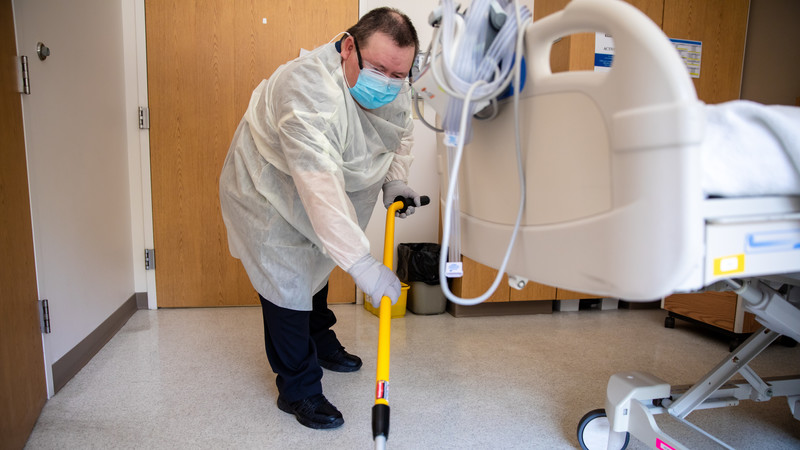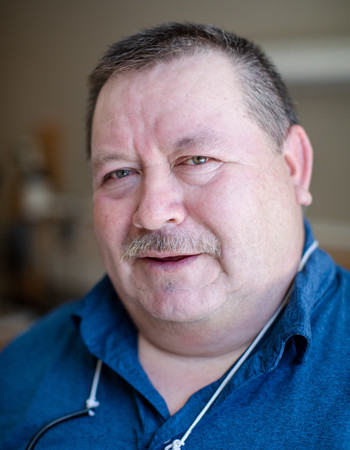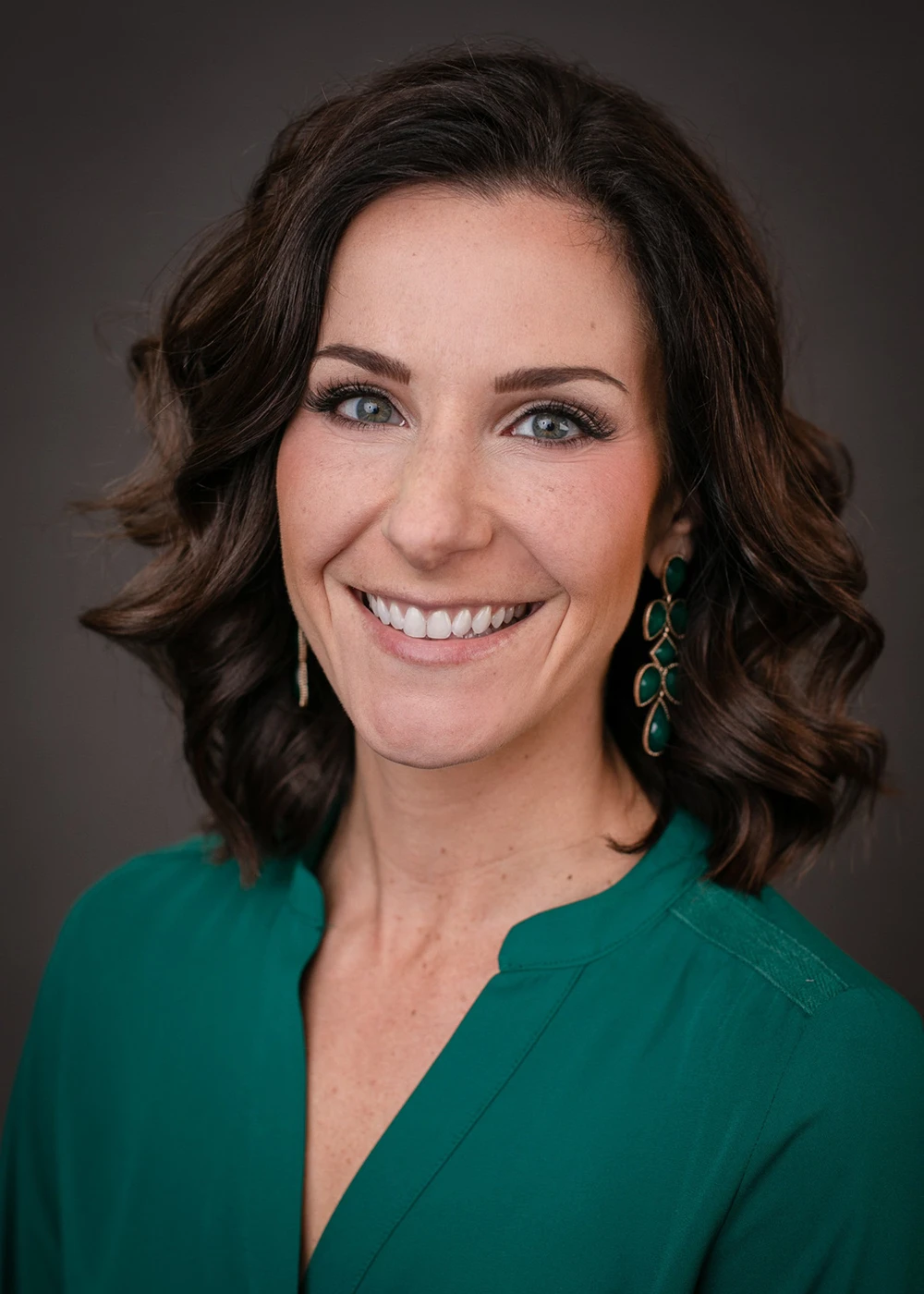




The Meaning of Care Magazine
With (a Mop) Head and Heart: A Day in the Life of a COVID-19 Warrior
Published: Nov. 19, 2020“Oh, we have to laugh, right? I love it,” Berrones said.
When silence resumes, the Mexico native takes the opportunity to inadvertently explain why he’s the perfect fit for his job.
“Always positive. That’s me. That’s Enrique. No disease is going to stop me.”
Low Morale and a Lean Cleaning Team
When COVID-19 cases began increasing in the Council Bluffs and Omaha communities, Chris Anderson, director of Environmental Services (EVS) at Jennie Edmundson, had one primary fear: “I mainly felt worried for my staff. I worried about their fears – how they’d react.”
As a kidney transplant recipient, Anderson is immunosuppressed. So, if he’s being honest, he’ll admit to fearing his own safety, too. But after Jennie Edmundson received its first COVID-positive patient, he knew what he had to do.
“I cleaned that first room and had my staff stand outside the door,” he said. “Just to give them a little courage and show them that I was never going to make them do anything I wouldn’t do.”
Not long after his demonstrations of bravery and a new rigorous cleaning protocol, he lost four staff members whose fears of the virus were too great for them to stay. Anderson was left with a lean team. Morale, he said, was low. That was, until a “blessing” walked in.
“A Breath of Fresh Air”
Berrones spent more than a decade at Jennie Edmundson before moving to Texas in 2013. His wife, a cancer survivor, chose to get treatment there to be closer to family. But after she entered remission, they returned to Omaha. Berrones rejoined the Jennie Edmundson family on May 11, 2020 – a time when his service was needed more than ever.
“We were definitely feeling it here – the effects of COVID-19,” said Anderson, who described his first encounter with Berrones as “a breath of fresh air.”

“He’s what you always hope for in a housekeeper,” Anderson added. “When he arrived, it was a blessing to the staff. He lifted them up. He lifted the patients up. You’d hear him echo through the halls, ‘I am Enrique! I am your housekeeper today!’ He makes everyone laugh. Because you cannot bring him down.”
“I love this job,” Berrones said. “I tell you what. The patients – that’s what I love. That is my priority. My cleaning is what keeps them safe and happy.”
If asked about his daily work routine, Berrones will proudly list each and every step. He takes them all very seriously. He’ll tell you how he straps on his gown, puts on his mask, double gloves his hands and lifts his goggles before opening every door as his mophead hits the floor.
“Before I take a step inside, I mop in front of me,” he said sternly. “Everything in the room, everything that gets touched – even the walls get cleaned with chemicals.”

He’ll light up when describing his approach to cleaning a room with a patient inside. It’s his favorite part of the job.
“I knock on the door. Sometimes they answer, sometimes they don’t. If they’re awake, I say, ‘Hi! Good morning! My name is Enrique! I’m working with housekeeping, and I’m here to clean your room.’ If they want to talk, OK, I talk. I make them feel comfortable while keeping my distance to protect them and protect myself. If they don’t talk to me, I give them respect, privacy. I do the best I can.”
He does the best he can as sweat accumulates on his forehead. His gown clings tightly to him. His goggles begin to fog.
“I feel very hot,” he said. “All the time. And it’s hard to see. But you know what? Sometimes we have to sacrifice ourselves a little bit. I just thank God I have a job.”
Berrones relies heavily on his job to support his family. With an immunocompromised wife at home, he takes careful precautions so that he doesn’t infect her or his 29-year-old son who stays home caring for her.
“This situation is delicate,” he said. “But I’m not scared. As long as I protect myself and the people around me, I feel secure.”
Anderson is extremely proud of his team’s resilience, teamwork and unwavering commitment to safety. He’s even more proud of the positive outlook they’ve maintained the past few months – something he largely credits to Berrones.
“He came in with a fresh attitude,” Anderson said. “It helped everyone. And it showed.”
The Critical Role of Housekeeping
Pandemic or not, EVS employees have always been a key part of patient care across Methodist.
“It takes a whole network,” said Bill Lydiatt, MD, chief medical officer and vice president of medical affairs for Methodist Hospital and Methodist Women's Hospital. “Every link in that patient care chain needs to be strong. Every link is important. But it starts with making sure our facilities have the lowest possible risk of infection.”
“We keep things clean. We keep things safe. We ensure an environment that allows patients to heal,” Anderson said.
Even Anderson, though, understands that housekeeping is hardly a career goal for anyone.
“Being a cleaning technician is a thankless job,” he said. “Anyone who stumbles upon it usually approaches every day with a simple going-through-the-motions attitude.”
But a big, boisterous voice and eyes that allude to a permanent mask-covered smile proved Anderson wrong. Some people – like Berrones – actually live for this job.

“This job is 100% important to me,” Berrones said. “This pandemic? We have to fight it. Continue. Continue. It’s not going to win. We are going to win. How? Take care of ourselves, take care of the other person and clean. Really good. That’s how we control this.”
It is with great sadness to note that Enrique passed away in October.
He is survived by his wife and son, who gave their blessings to the publication of his story and COVID-19 journey.
Enrique truly was a warrior among his colleagues, a joy to those who knew him and a light that continues to shine on those who will forever love and miss him.
Photos and video by Daniel Johnson
More Resources
- Read about the CDC’s recommendations for safe holiday celebrations.
- Learn the difference between a cold, the flu and COVID-19.
- Get similar articles delivered straight to your inbox.


